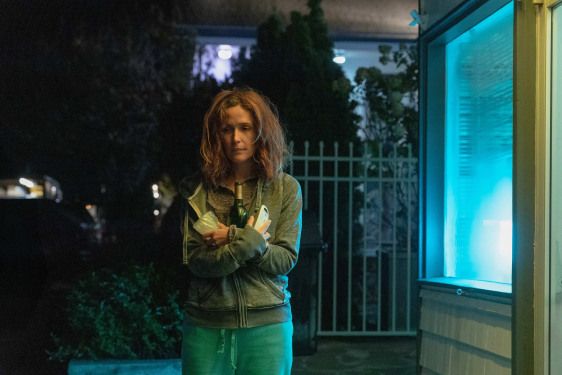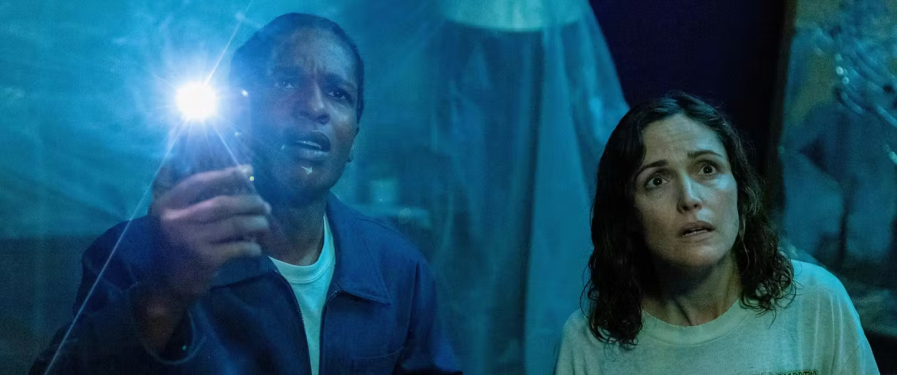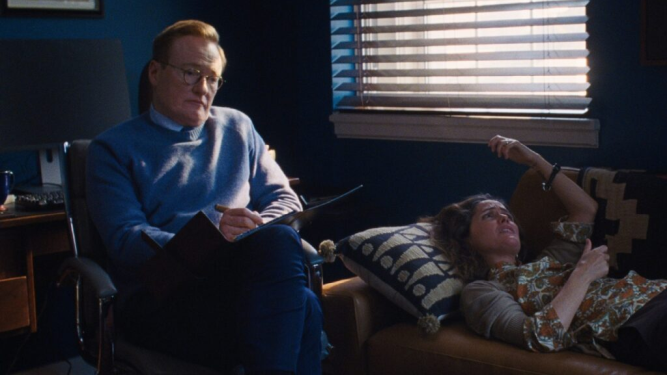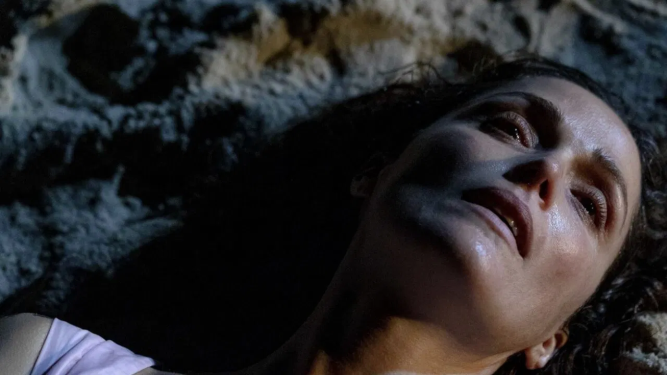A24 has made a name for itself as a purveyor of odd, artsy and sometimes divisive horror flicks. And while this has created a kind of aura of nonsense around their releases—people are always trying put modifiers on “horror” to separate the kinds they like from the kinds they don’t—it has definitely allowed for small, intriguing, thought-provoking films that might not be widely appealing to genre fans. Dream Scenario, for example, tells the story of a schlub (Nic Cage) who starts appearing in other people’s dreams—for no reason.
It wasn’t very successful financially ($12M on a $10M budget, allegedly), and even artistically it was kind of a miss—but it was interesting. It’s not horror, though there are some scary parts to it—it’s almost magical realism, really. I’m sure it was difficult to market and marketing to horror audiences probably accounted in part for its failure.
Which brings me to If I Had Legs, I’d Kick You, Mary Bronstein’s masterpiece of…of what? It’s not horror, though there is certainly an element of horror to this story. It’s sort of “slice-of-life”, where the life being presented is one that nobody wants to visit.

“How’s my life going? Well, I’ve just stolen a bottle of wine from the front desk area, primarily because the clerk’s a real piece-of-work. How’s yours?”
Rose Byrne (Insidious, Bridesmaids, Spy) plays Linda, a woman who is trying to manage her daughter’s condition while her husband (Christian Slater!) is away somewhere. When we join her, he’s been away maybe…a week? Or two? It’s not clear, and one of the things this movie does very well is immerse us in Linda’s sense of time, which is highly fractured, stretching out and compacting according to various events. (Almost all movies, by necessity and tradition, give us a distorted view of time, but this one does so very consciously.)
Linda’s falling apart when we meet her and so is her house, the first floor ceiling of which caves in and forces Linda and “Child” (Delaney Quinn, also in this years remake of The Roses) to move out and into a dubious motel while the ceiling is repaired.
Nobody’s handling this well, and the camera stays on Linda’s face as she hears her child complaining and being difficult, and deals with the various “programs” that are meant to help the Child, but also result in creating tremendous stress for Linda. In fact, they may primarily create this stress. Since Linda is an unreliable narrator, it is nigh impossible to tell what’s what in this story.

“Come see my hole!” turns out to be literal (and not an invitation to go watch Guillermo del Toro’s ‘Frankenstein’).
We don’t know what the Child’s mysterious problem is, only that there are enough others like her for their to be a large institute devoted to helping her. We know only that it involves food: The Child does not eat well, and must gain weight in order to have a tube removed.
The Therapist (Conan O’Brien!) is worthless, bored of Linda and—well, there’s a lot going on there, which I don’t want to reveal in case you decide you want to see this nearly two hour, stress-inducing, picture-perfect portrayal of what it’s like trying to deal with the outer reality and internal struggles that accompany having a sick child in this society.
There are just a lot of perfectly ordinary dramatic elements that count as twists here, and I enjoyed them (to the extent that this movie can be “enjoyable”), and quite a few are darkly humorous.
The strength of this movie is that the characters are extremely well-drawn. One element that’s stressful (and there are many) is that the dialogue is kind of disjointed. Why? Because one person will say something, then the next person will say something after, and you’ll realize the response wasn’t a response. The person is just waiting for their turn to talk.

“You really nailed that whole ‘Haiti’ thing, didn’t you, Conan?” “Stop breaking character, Rose.”
People are not nice to each other, much, either. People treat Linda indifferently or badly and she tends to treat them that way in return. Bronstein and Byrne manage to create this antagonistic world without demonizing anyone. You’re rooting for Linda, even if she sometimes doesn’t seem to deserve it. And you can see how she provokes antagonism in others.
Bronstein herself plays Linda’s major human antagonist, the doctor to The Child and head of the institution, whose sympathy is as oppressive as her rules are inflexible. She’s demanding Linda attend a group session for mothers which is a thing Linda’s avoiding, and which is just as unhelpful and soul-grinding as it sounds.
It reminded me more than anything of “The Death of Ivan Ilych,” where the a small but ultimately fatal accident reveals to Ivan the complete facade that is late 19th century Russian culture.
It is extremely well done. It handles the self-medicating unreliable narrator thing excellently.
On the other hand, would I recommend it? It borders on a kind of trauma to watch. The Boy, who has not himself had a medically compromised child, enjoyed it more than I did, but I have no doubt that my own experience is at the root of that.
I will say this: It’s a kind of a happy ending—not a Hollywood happy ending but nothing bleak or nihilistic. The camerawork is amazing, deftly giving the audience an insight into Linda’s mental state. The spaces we experience are as cramped as her mental state.

TFW when you throw yourself into the sea per Matthew 18:6, only to have the sea reject you and throw you back out.
